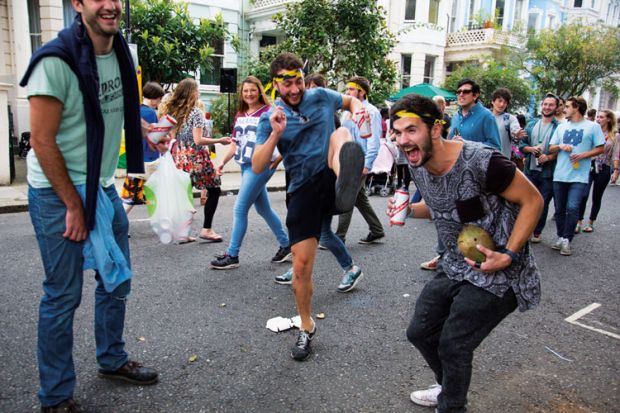Source: Corbis
Lairy lads: behaviour is a challenge
Universities should prioritise tackling “lad culture” on their campuses to prevent it seeping into academic life, a conference has heard.
Research involving staff at six English universities found that the institutions were not actively involved in challenging the phenomenon, which, according to those questioned, is primarily characterised by drunken male students behaving in a sexist or demeaning way towards women.
Racism and homophobia were also highlighted as possible manifestations of lad culture, according to researchers Vanita Sundaram, of the University of York, and Carolyn Jackson, from Lancaster University.
Dr Sundaram told the first regional summit on the issue, held at Northumbria University on 15 April, that lad culture could permeate into academic contexts.
Some interviewees complained of disruptive behaviour in lectures, while others highlighted misogynistic comments.
But the research, which drew on a sample of about 120 academic and administrative staff at varying levels of seniority, found that lad culture was not always viewed as being problematic.
Some interviewees said that it was best seen as a “source of fun” or mentioned what they viewed as beneficial consequences of socialisation and group membership.
Speaking to Times Higher Education after the event, Dr Sundaram said that the project indicated that awareness of the impact of lad culture on female students needed to be increased.
“Higher education institutes should prioritise tackling ‘lad culture’ or the specific behaviours associated with this [such as] sexism, misogyny, racism, homophobia, and they could possibly include it as part of existing gender equality drives or initiatives,” she said.
The project, which was funded by the Society for Research into Higher Education, found that all the universities did have policies covering issues such as equality and harassment. Student activism could play an important role in pushing for lad culture to be targeted more vigorously, Dr Sundaram said.
The event also heard from the Good Lad Workshop, which runs events with male students about positive masculinity.
Dave Llewellyn, who helped to set up the scheme in 2013, said that participants had responded well to being asked about how they would behave in certain situations as “good lads” rather than being treated as “potential perpetrators of harm to women”.
Speaking after the event, Mr Llewellyn said that there had been a “real ramp-up” of activity to tackle lad culture but admitted that there was still a “long way to go”.
Register to continue
Why register?
- Registration is free and only takes a moment
- Once registered, you can read 3 articles a month
- Sign up for our newsletter
Subscribe
Or subscribe for unlimited access to:
- Unlimited access to news, views, insights & reviews
- Digital editions
- Digital access to THE’s university and college rankings analysis
Already registered or a current subscriber? Login





